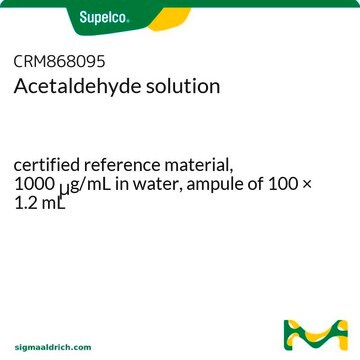All Photos(1)
About This Item
Linear Formula:
CH3CHO
CAS Number:
Molecular Weight:
44.05
MDL number:
UNSPSC Code:
12352100
eCl@ss:
39021102
PubChem Substance ID:
NACRES:
NA.22
Recommended Products
form
liquid
Quality Level
concentration
5 M in THF
refractive index
n20/D 1.389
density
0.868 g/mL at 20 °C
0.843 g/mL at 25 °C
functional group
aldehyde
storage temp.
2-8°C
SMILES string
[H]C(C)=O
InChI
1S/C2H4O/c1-2-3/h2H,1H3
InChI key
IKHGUXGNUITLKF-UHFFFAOYSA-N
Looking for similar products? Visit Product Comparison Guide
Signal Word
Danger
Hazard Statements
Precautionary Statements
Hazard Classifications
Carc. 1B - Eye Irrit. 2 - Flam. Liq. 2 - Muta. 2 - STOT SE 3
Target Organs
Central nervous system, Respiratory system
Supplementary Hazards
Storage Class Code
3 - Flammable liquids
WGK
WGK 3
Flash Point(F)
-25.1 °F - closed cup
Flash Point(C)
-31.7 °C - closed cup
Choose from one of the most recent versions:
Already Own This Product?
Find documentation for the products that you have recently purchased in the Document Library.
Customers Also Viewed
Nikoline Borgermann et al.
The EMBO journal, 38(8) (2019-03-28)
DNA-protein crosslinks (DPCs) are highly cytotoxic lesions that obstruct essential DNA transactions and whose resolution is critical for cell and organismal fitness. However, the mechanisms by which cells respond to and overcome DPCs remain incompletely understood. Recent studies unveiled a
Tetsuji Yokoyama et al.
Alcoholism, clinical and experimental research, 29(4), 622-630 (2005-04-19)
Elevated mean corpuscular volume (MCV) is a traditional biological marker for alcohol abuse and alcoholism, but the underlying mechanism is unclear. Three recent epidemiologic studies consistently showed that MCV was elevated by alcohol drinking more markedly among individuals with genetically
Hyo-Jung Kwon et al.
Hepatology (Baltimore, Md.), 60(1), 146-157 (2014-02-05)
Aldehyde dehydrogenase 2 (ALDH2) is the major enzyme that metabolizes acetaldehyde produced from alcohol metabolism. Approximately 40-50% of East Asians carry an inactive ALDH2 gene and exhibit acetaldehyde accumulation after alcohol consumption. However, the role of ALDH2 deficiency in the
Tommaso Mello et al.
Molecular aspects of medicine, 29(1-2), 17-21 (2008-01-01)
Alcohol abuse is one of the major causes of liver fibrosis worldwide. Although the pathogenesis of liver fibrosis is a very complex phenomenon involving different molecular and biological mechanisms, several lines of evidence established that the first ethanol metabolite, acetaldehyde
Mikko Salaspuro
Journal of digestive diseases, 12(2), 51-59 (2011-03-16)
Aldehyde dehydrogenase (ALDH2) and alcohol dehydrogenase (ADH) gene polymorphisms associating with enhanced acetaldehyde exposure and markedly increased cancer risk in alcohol drinkers provide undisputable evidence for acetaldehyde being a local carcinogen not only in esophageal but also in gastric cancer.
Our team of scientists has experience in all areas of research including Life Science, Material Science, Chemical Synthesis, Chromatography, Analytical and many others.
Contact Technical Service






